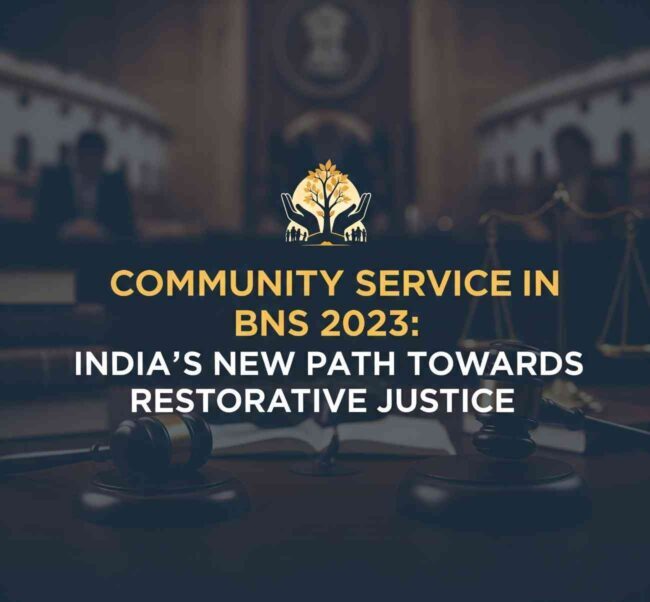BNS 2023 introduces community service as an alternative to prison for minor offenses in India, promoting rehabilitation, reducing overcrowding, and supporting restorative justice principles
A New Chapter in India’s Criminal Justice System
India’s criminal justice system has taken a decisive step towards reform with the introduction of the Bharatiya Nyaya Sanhita (BNS) 2023, replacing the long-standing Indian Penal Code. One of its most forward-thinking reforms is the inclusion of community service as an official form of punishment. This shift reflects a move away from a solely punitive model and towards a system that emphasizes rehabilitation, accountability, and reintegration into society.
What Community Service Means Under BNS 2023
Section 23 of the Bharatiya Nagarik Suraksha Sanhita (BNSS) 2023 describes community service as court-directed work that serves the public interest, carried out by the offender without any form of remuneration.
This addition makes community service the sixth recognized punishment in Indian law — joining the death penalty, life imprisonment, imprisonment, forfeiture of property, and fines.
The goal is to provide an alternative to prison for certain offenders, especially first-time or low-risk individuals, enabling them to make amends without losing their social and family connections.
Crimes Where Community Service Can Apply
The BNS 2023 specifies certain non-violent and minor offenses where community service may be ordered. Examples include:
- Section 202: Public servants unlawfully engaging in trade.
- Section 209: Non-compliance with a proclamation issued under Section 84 of the BNSS by failing to appear.
- Section 303: Theft of property valued below ₹5,000, when returned by a first-time offender — this provision acknowledges the scope for rehabilitation when the offender shows remorse through restitution.
- Section 356: Defamation cases, where repair of harm may be more meaningful than imprisonment.
- Section 314: Receiving stolen property of low value.
- Section 302: Theft of property under ₹20,000 in specific situations.
These provisions reflect a measured and reform-focused approach, balancing accountability with opportunities for reformation.
Why Community Service Matters
The philosophy behind community service is rooted in restorative justice — a belief that justice should repair harm rather than simply punish. This model sees crime as a wrong done not just to a victim but to the broader community.
Traditional prison sentences can isolate individuals, damage family ties, and lead to long-term stigma. In contrast, community service allows offenders to remain engaged in productive work, develop skills, and directly give back to society.
This form of punishment fulfills multiple purposes:
- Deterrence – discouraging future crimes.
- Rehabilitation – helping offenders change behavior.
- Restoration – repairing damage caused to society.
- Public Safety – preventing minor offenders from being exposed to hardened criminals in prisons.
How It Will Be Implemented
The law gives judges discretionary power to decide when community service is appropriate. Factors they can consider include:
- The offender’s criminal history.
- The seriousness of the offense.
- The offender’s willingness to reform.
- The needs of the community.
For effective execution, courts, probation officers, and community organizations must work together. The assigned work must be meaningful, proportional to the crime, and genuinely beneficial to the community.
Advantages of Community Service
Compared to imprisonment for minor offenses, community service offers several benefits:
- Reduces prison overcrowding – easing pressure on the correctional system.
- Cuts costs – reducing the financial burden of incarceration on the state.
- Preserves family and work life – allowing offenders to maintain social and economic stability.
- Builds positive skills – giving offenders practical work experience and a sense of responsibility.
Challenges Ahead
While promising, this reform also faces hurdles:
- Monitoring – ensuring offenders complete their assigned work.
- Consistency in sentencing – avoiding wide variations between different courts.
- Avoiding exploitation – ensuring the work is fair and safe.
- Public perception – gaining trust that community service can be as effective as prison for certain crimes.
The success of this system also depends on having suitable community projects and organizations to host offenders, requiring strong partnerships between the legal system and civil society.
Learning from Other Countries
India’s move aligns with international best practices. Nations like the UK, Canada, and Australia have long used community service for minor crimes, with research showing no higher reoffending rates compared to imprisonment. Many offenders even develop stronger community ties, reducing the likelihood of repeat offenses.
Looking Ahead
The adoption of community service in the BNS 2023 paves the way for far-reaching reforms. With proper monitoring, public education, and judicial training, this model could be expanded to cover more offenses and paired with specialized rehabilitation programs.
Continuous evaluation will be key — ensuring the punishment truly benefits victims, the community, and the offender’s rehabilitation.
Conclusion
By introducing community service as a sentencing option, India has taken a progressive step towards a humane, fair, and effective justice system. This approach recognizes that minor offenses often require solutions that heal rather than harm, offering a path where offenders can rebuild trust, contribute positively, and rejoin society without the lasting damage of imprisonment.
If implemented with care, this reform could set a new benchmark for criminal justice in India — one where punishment and rehabilitation are integrated.

























